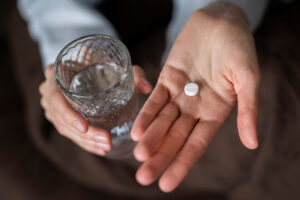Can high cholesterol cause erectile dysfunction?
For many men, this connection is not immediately obvious, but understanding the relationship between cholesterol and sexual performance is essential for maintaining both cardiovascular and reproductive health.
Elevated cholesterol levels can silently damage blood vessels, impair circulation, and contribute to conditions that directly impact erectile function.
This article explores how high cholesterol may contribute to erectile dysfunction (ED), what signs to watch for, and how to take proactive steps to restore sexual vitality.
Can High Cholesterol Cause Erectile Dysfunction?
Cholesterol is a fatty substance that circulates in the blood and is essential for cell membrane integrity and hormone production.
However, when low-density lipoprotein (LDL), also known as “bad” cholesterol, builds up in the arteries, it can lead to atherosclerosis — a condition in which the blood vessels become narrowed and hardened.
This vascular damage restricts blood flow throughout the body, including to the penis.
Erections rely heavily on sufficient blood flow, and any impediment in the arteries can compromise this function.
Men with high cholesterol often experience endothelial dysfunction, a condition where the inner lining of blood vessels fails to dilate properly.
This further limits circulation and makes it more difficult to achieve or maintain an erection.
Research published in journals such as the Nature Reviews Urology has confirmed that hyperlipidemia is a major risk factor for ED.
In many cases, erectile dysfunction may be one of the earliest warning signs of cardiovascular problems driven by high cholesterol.
The Role of Blood Flow in Achieving and Maintaining Erections
An erection begins when sexual stimulation triggers the release of nitric oxide in the penile blood vessels.
Nitric oxide causes the smooth muscles in the corpus cavernosum to relax, allowing blood to flow in and become trapped, creating the rigidity necessary for intercourse.
When blood vessels are clogged or inflamed due to high cholesterol, this process is disrupted.
Reduced nitric oxide availability and impaired vascular relaxation lead to weaker or shorter-lasting erections.
In some cases, the body may compensate temporarily, but as atherosclerosis progresses, erectile function deteriorates.
This mechanism highlights the intimate connection between vascular health and sexual performance.
Early Signs That Cholesterol May Be Impacting Sexual Health
Recognizing the early warning signs can be critical for preventing long-term erectile dysfunction.
Men may first notice difficulty maintaining an erection, especially under stress or after alcohol consumption.
A decrease in morning erections can also signal diminished vascular responsiveness.
Low libido, fatigue, and reduced exercise tolerance may accompany these symptoms.
Cholesterol imbalances often go undiagnosed until more serious complications appear, making sexual health symptoms an important red flag.
In men with no obvious psychological cause for ED, screening for lipid abnormalities can reveal underlying vascular contributors.
Addressing the root cause early can lead to better outcomes both sexually and systemically.
Risk Factors That Worsen Both ED and High Cholesterol
Several lifestyle and physiological factors contribute to the development of both erectile dysfunction and elevated cholesterol.
A sedentary lifestyle reduces HDL (“good”) cholesterol and contributes to weight gain.
Diets high in saturated fats, refined sugars, and processed foods can increase LDL and triglyceride levels.
Obesity, particularly visceral fat, promotes systemic inflammation and hormonal imbalance.
Smoking damages the endothelium and accelerates arterial plaque formation.
Excessive alcohol intake can impair liver function and lipid metabolism.
Diabetes and hypertension are commonly associated with dyslipidemia and vascular insufficiency.
Stress and anxiety, though often seen as psychological, can elevate cortisol and interfere with sexual performance and lipid regulation.
All these factors create a synergistic effect that amplifies the risk of both ED and cardiovascular disease.
How to Know If High Cholesterol Is the Cause of Your ED
If you’re experiencing erectile dysfunction and suspect high cholesterol may be a factor, a comprehensive medical evaluation is recommended.
Blood tests including a lipid panel can assess total cholesterol, LDL, HDL, and triglyceride levels.
Other useful markers include C-reactive protein (CRP), fasting glucose, and testosterone levels.
Your provider may also order a Doppler ultrasound of the penis to evaluate blood flow.
An electrocardiogram (ECG) or stress test might be advised if cardiovascular risk is suspected.
A detailed review of your medical history, medications, and lifestyle habits will help pinpoint the underlying contributors.
Identifying high cholesterol as a cause allows for targeted interventions that can improve both vascular and sexual health.
Lifestyle Changes to Improve Cholesterol and Erectile Health
Improving your lifestyle is one of the most effective ways to lower cholesterol and enhance erectile function.
Adopt a diet rich in fiber, lean proteins, omega-3 fatty acids, and colorful vegetables.
Limit saturated fats, trans fats, and added sugars to reduce LDL and triglyceride levels.
Regular aerobic exercise increases HDL and supports vascular health.
Weight loss, even as little as 5–10% of body weight, can yield significant improvements.
Quit smoking to restore endothelial function and circulation.
Limit alcohol to moderate levels and avoid binge drinking.
Stress reduction techniques such as meditation, yoga, and deep breathing can support both cardiovascular and sexual wellness.
Establishing consistent sleep patterns is also crucial for hormonal balance and energy levels.
Medical and Natural Approaches to Treatment
Conventional treatments for high cholesterol often involve statins, which lower LDL levels and reduce cardiovascular risk.
However, some men report side effects from statins, including muscle pain, fatigue, and in rare cases, decreased libido.
Other options include fibrates, niacin, and PCSK9 inhibitors, though these are typically reserved for more severe dyslipidemia.
For men seeking natural alternatives, plant sterols, red yeast rice, garlic, and soluble fiber have shown cholesterol-lowering effects.
Supplements like omega-3 fish oil and coenzyme Q10 may also support lipid metabolism and endothelial health.
Combining these with lifestyle changes can offer a holistic path to recovery.
It’s important to consult a healthcare provider before starting any supplement regimen, especially if you take other medications.
How TribalForce X Supports Male Sexual Performance
TribalForce X is a natural dietary supplement designed to support men’s sexual health, particularly in those facing challenges linked to circulation and energy.
Its formula includes plant-based ingredients known to enhance testosterone levels, improve blood flow, and elevate libido.
Key components like Ginkgo Biloba and L-Glutamine support nitric oxide production and vascular function.
Bacopa Monnieri and Huperzine-A contribute to mental clarity and stress reduction, factors that indirectly influence sexual performance.
TribalForce X is stimulant-free, non-GMO, and suitable for daily use.
It’s especially beneficial for men over 30 who want to improve their vitality naturally, without synthetic hormones or harsh chemicals.
By supporting overall circulatory health and hormonal balance, this supplement may complement cholesterol-lowering efforts and restore confidence in the bedroom.
Don’t Ignore the Signals Your Body Sends
If you’re dealing with erectile issues and have risk factors for high cholesterol, it’s time to take a closer look at the connection.
Early intervention can lead to improvements in both your sexual and cardiovascular health.
TribalForce X offers natural support to help restore energy, enhance circulation, and promote healthy libido.
To see how it fits into your routine, visit the official TribalForce X website and take the first step toward renewed performance.









